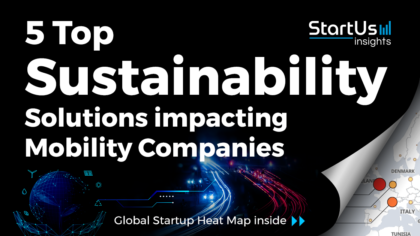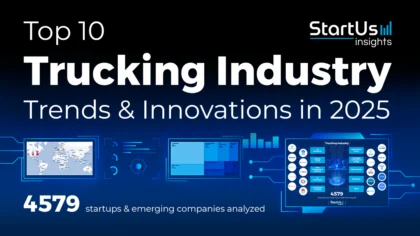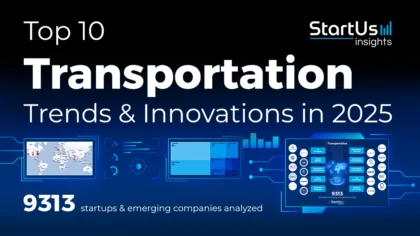Accelerate Productivity in 2025
Reignite Growth Despite the Global Slowdown
Staying ahead of the technology curve means strengthening your competitive advantage. That is why we give you data-driven innovation insights into the mobility sector. This time, you get to discover 5 hand-picked startups developing sustainability solutions.
Out of 916, the Global Startup Heat Map highlights 5 Top Sustainability Solutions impacting Mobility Companies
The insights of this data-driven analysis are derived from the Big Data & Artificial Intelligence-powered StartUs Insights Discovery Platform, covering 2 093 000+ startups & scaleups globally. The platform gives you an exhaustive overview of emerging technologies & relevant startups within a specific field in just a few clicks.
The Global Startup Heat Map below reveals the distribution of the 916 exemplary startups & scaleups we analyzed for this research. Further, it highlights 5 startups that we hand-picked based on criteria such as founding year, location, funding raised, and more. You get to explore the solutions of these 5 startups & scaleups in this report. For insights on the other 911 sustainability solutions for mobility companies, get in touch.
Vay enables Driverless Ridesharing
Ridesharing makes an impact on environmental safety in many ways. In particular, it allows for cooperative and rapid public transportation. Since the same car makes multiple journeys, it also optimizes public transport. Startups develop remote driver solutions using technologies like augmented vision and long-distance communication to further improve the availability and efficiency of ridesharing.
German startup Vay provides driverless ride-sharing. The startup’s solution enables remote operation of a vehicle with operator control, ensuring safe driverless mobility service. With tele drivers, users have the option to avail the service as a remotely driven taxi. Through a cab-car approach, the startup reduces the carbon footprint of operating a vehicle on-road.
Bolt Mobility offers Electric Micromobility
Cars and motorcycles are not affordable options of transportation for everybody. There are size constraints that further restrain individuals from availing themselves of these vehicles. However, the miniaturization of electric engines provides micromobility alternatives, suitable for all users. For example, startups offer electric micromobility solutions that offer fast transportation for individuals with budget or space constraints.
US-based startup Bolt Mobility offers sustainable micromobility with its all-electric fleet of two-wheelers. Bolt Two and Bolt One are the startup’s vehicles that have a range of over 60 km and 40 km, respectively. Both options come with swappable batteries and LCD displays that provide details of the journey. The startup’s fleet serves as an eco-friendly mobility choice for users.
Unleash Future Boats advances Emission-free Marine Transportation
Increasing congestion and pollution from all forms of transportation drives emerging companies to develop sustainable solutions for the future. The way people move from one place to the next is still heavily reliant on fossil fuels. To mitigate and eventually reverse the effects of harmful climate change, startups develop numerous alternatives to petrol and diesel. These include green hydrogen, renewables-powered systems, low carbon fuels, and advanced battery technologies. Together, the solutions aim to improve local and global ecosystems by transforming the transportation and mobility industries.
German startup Unleash Future Boats develops zero-emission autonomous marine transportation solutions. The startup is currently in the process of launching its autonomous, electric, and hydrogen-powered boats. FutureOne is a passenger boat that holds up to 12 people in addition to provisions for bringing bikes, wheelchairs, or strollers. Next, CargoOne facilitates sustainable maritime shipping and also closes the digital connectivity gap between vessels and port operations. In addition, the startup provides advanced sensor solutions for maritime companies as well as support for engineering green boats.
iX Energy provides Hybrid Electric Retrofits
The existing paradigm of fossil fuel vehicles and the cost of shifting to electric options make immediate electrification challenging. However, fossil fuel vehicles contribute to greenhouse gas emissions and are unsustainable. As a result, startups develop retrofitting solutions that enable semi-electric options in fossil-fuel-based vehicles. For example, the installation of regenerative braking systems allows vehicles to limit dependency on fossil fuels.
Indian startup iX Energy offers hybrid electric retrofits for buses and trucks. Using regenerative braking, the iX HEV kit converts kinetic energy into electric charge and stores it in the smart battery box. In comparison to a diesel-based vehicle, this allows for a significant reduction in fuel costs and enables fleet owners to transform fuel-intensive vehicles into sustainable models.
Squad Mobility engineers Suburban Solar-Powered Vehicles
With an increase in the population of global cities, traffic congestion and vehicular air pollution also increase. Presently, for short-distance trips, individuals still utilize big gas-guzzling vehicles that further compound urban issues. Moreover, vehicles require being driven for a certain distance until fuel efficiency factors in, resulting in higher fuel costs and energy waste. To solve these mobility challenges, startups develop micro-cars for urban travel, allowing them to rely entirely on renewables that contribute to less congested roads.
Squad Mobility is a Dutch startup that develops solar-powered vehicles. Squad, the startup’s micro-car, uses solar panels on its roof to charge the batteries. The solar panel charges the vehicle for up to 20 km of drivable distance per day. It also comes with portable batteries which connect to a normal power socket for charging, providing more range. Thus, consumers who travel minimal distances regularly are able to rely on a solar-powered car, increasing the transition to clean mobility.
Discover more Mobility Startups
Mobility startups such as the examples highlighted in this report focus on shared mobility, autonomous vehicles, hybrid vehicles, and battery-powered EVs. While all of these technologies play a major role in advancing the mobility industry, they only represent the tip of the iceberg. To explore more mobility technologies, simply get in touch to let us look into your areas of interest. For a more general overview, you can download our free Mobility Innovation Report to save your time and improve strategic decision-making.








